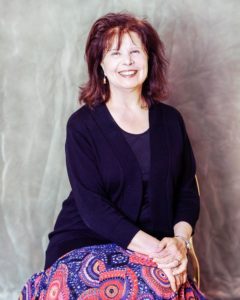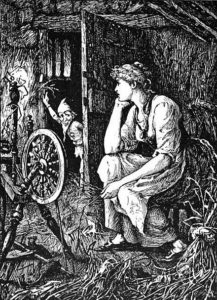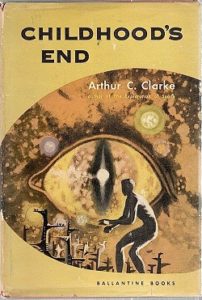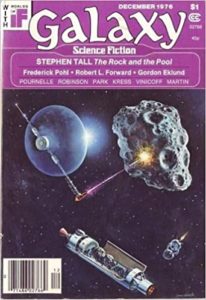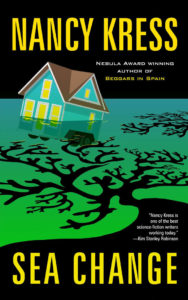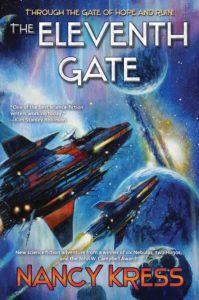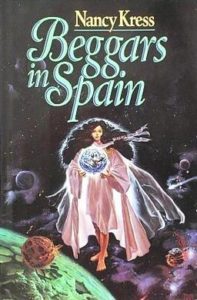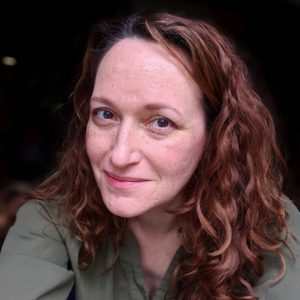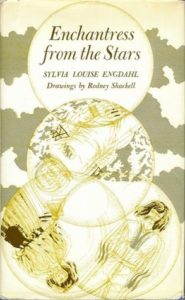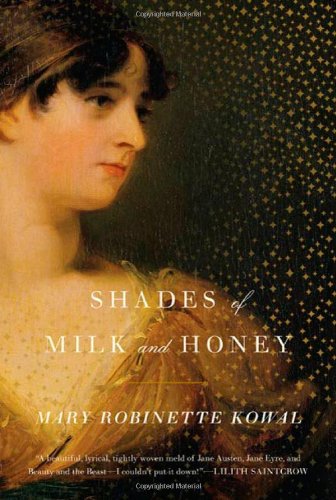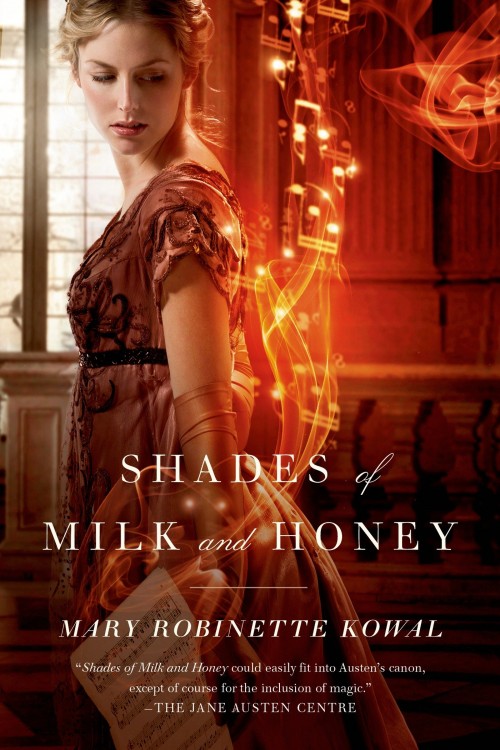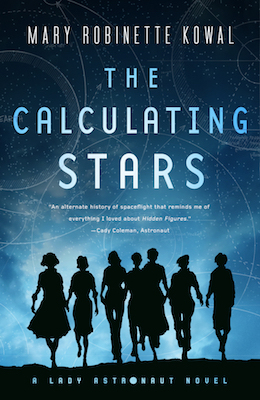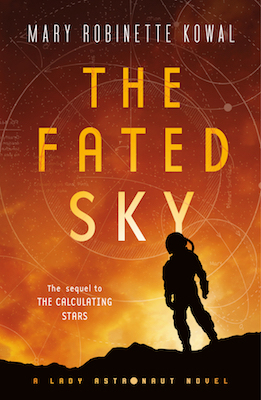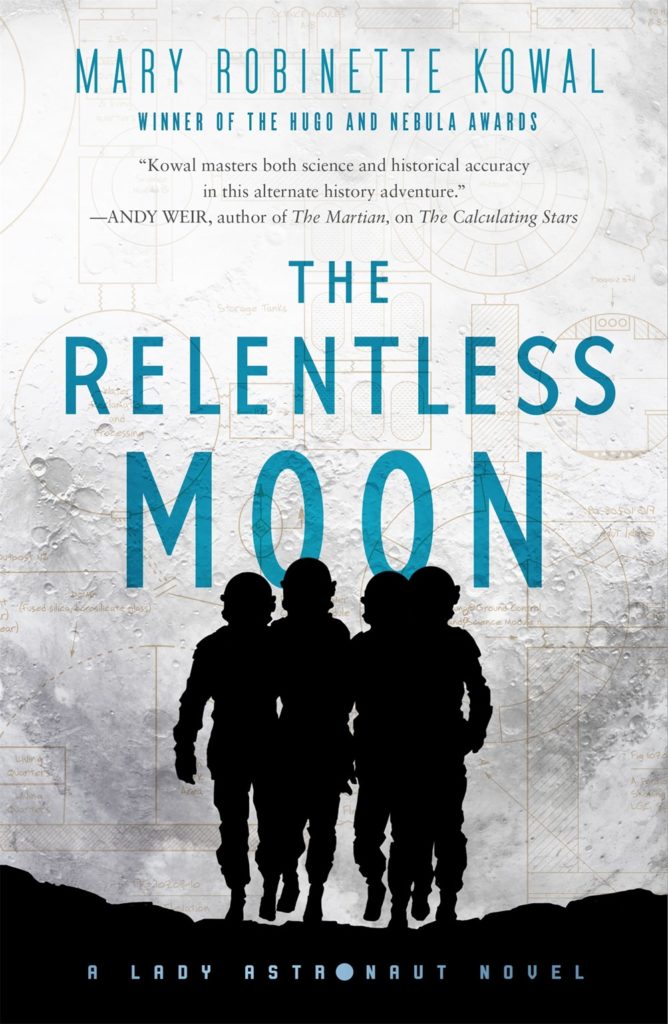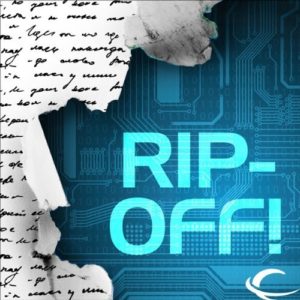Podcast: Play in new window | Download | Embed
Subscribe: Apple Podcasts | Spotify | Amazon Music | Email | TuneIn | RSS | More
An hour-plus interview with James Morrow, World Fantasy Award, Nebula Award, Theodore Sturgeon Memorial Award and Grand prix de l’Imaginaire-winning author of eleven novels and many shorter works.
Website
www.jamesmorrow.net
Facebook
@james.morrow.754570
Twitter
@jimmorrow11
The Introduction
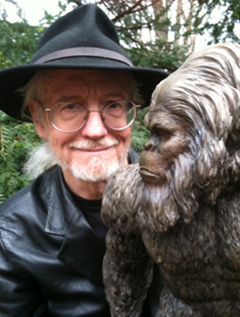
Born in 1947, James Morrow has been writing fiction ever since. As a seven-year-old living in the Philadelphia suburbs, he dictated the story of the duck family to his mother, who dutifully typed it up and bound the pages with yarn. Upon reaching adulthood, Jim channeled his storytelling urge toward the production of speculative literature.
The majority of his eleven novels are written in satiric theological mode, including the critically acclaimed Godhead trilogy. He has won the World Fantasy Award twice, for Only Begotten Daughter and Towing Jehovah, the Nebula Award twice, for his story “The Deluge” and the novella City of Truth, and the Theodore Sturgeon Memorial Award once for the novella Shambling Towards Hiroshima.
In recent years, he’s produced historical fiction informed by a fantastical sensibility, including The Last Witchfinder, about the birth of the Enlightenment, and Galapagos Regained, about the coming of the evolutionary worldview, and his novel-in-progress sardonically reimagines the 325 AD Council of Nicaea. The French translation of his Darwin extravaganza recently received the Grand prix de l’Imaginaire. His most recent work to see print is The Purloined Republic, one of the three novellas that constitute And the Last Trump Shall Sound.
The (Lightly Edited) Transcript
So, Jim, welcome to The Worldshapers.
Thank you very much, Ed. Happy to be here.
Happy to make the connection. I don’t believe we’ve ever crossed paths at a convention or anything in person, but it was through Mickey Mickkelson, who’s my publicist and is doing some work as well with Arc Manor. I guess we made the connection because of And the Last Trump Shall Sound, which is out or about to come out. Is it out or about to come out? As we talk, because it will be out by the time this goes live.
September 22 is the pub date. I see you’re about to appear on The Coleman Show, which I’m also booked on. You’re doing that tomorrow, right?
Yeah. As we talk. By the time this comes out, this will all be a few weeks in the past. I sometimes forget that when I’m doing these things, that this is not a live broadcast, but it does not live, it is recorded. And at the time it comes out, all of this stuff will be out. Well, let’s that start, as I do, by taking you, as I like to say, I’m totally going to put reverb on it someday, back into the mists of time, where, as I also like to say, it is mistier for some of us than others. How did you become interested in, you know, you mentioned writing your first story when you were seven years old, so obviously, that came along early, but not just writing, but also science fiction fantasies specifically. How did that come about for you, and where did you grow up and go to school and all that good stuff?
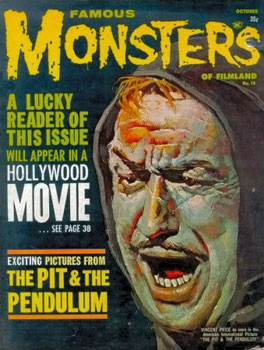
Okay. I grew up in the suburbs of Philadelphia, a little town called Roslyn. I guess there are two different tributaries feeding the river of my imagination. One comes from low culture, sort of popular culture, the other from a more literary zone, high, high culture. I’d say, unlike the majority of guests you have on The Worldshapers, I was not a voracious reader as a kid. My introduction to genre was through the more tawdry venue of Famous Monsters of Filmland Magazine. I still have the first, Forrey Ackerman’s sort of love letter to the history of horror films, and so was watching movies on television that had that fantastic sensibility that ultimately, I would argue, led to my producing prose fiction in that genre. My friends and I in high school subscribed to Famous Monsters and would go to each other’s houses to watch these movies. And we started our own filmmaking club.
Growing up in Roslyn, Pennsylvania, I was very near a large cemetery, and this became the setting for about half the movies that we made. But we did, these were 8mm home movies, but we thought of them as feature films, and we were in them, but we thought of ourselves as adult actors. But we did adaptations of “The Rhyme of the Ancient Mariner,” and Poe’s “The Tell-Tale Heart,” and the other films we did had titles like Cagliostro, The Sorcerer, and The Futurians. But let me then jump to the other tributary of more literary or high culture. In my 10th-grade world literature class taught by the amazing Mr. Giordano (sp?), I came to understand for the first time that a novel was not simply about following the vicarious adventures of non-existent people, that a novel could be a matrix of ideas, and novelists were people who had something to say. And the syllabus was just extraordinary. We read Voltaire’s Candide, we read Dostoevsky’s Crime and Punishment, the plays of Ibsen, Kafka’s The Trial, Madame Bovary by Flaubert. And I just was so entranced by the sensibility of those authors. They were people who did not settle for the received wisdom of their day. They stood outside of their cultures. They were at odds with conventional thought, and they tended to be very much religious skeptics, doubters. And not just . . . it was kind of like my inverse road to Damascus. You know, I wanted to sign up for the sort of honest atheism of Albert Camus and I, you know, and I thought maybe I could do it myself someday, that I could write a novel of ideas.
Science fiction, of course, demands that you play with ideas. It’s often called the literature ideas of ideas. You get this wonderful toolkit when you join that club of robots and time travel and rocketships, all of which become techniques for getting perspective on the world, for holding reality up to a kind of funhouse mirror and, you know, and then maybe telling people a thing or two, arguing for a way of seeing the world. And one day, I found myself possessed by an idea for my first novel.
When you were doing the film work, were you doing some of the scripting for those films where you’re writing for that?
Yeah, they were my . . . I guess there were like four of us who were in this, who had created this club, and I was sort of recognized me as the one who did pretty well with dialogue and was the writer of the group. But we all took turns behind the camera, we all took turns in front of the camera. I usually did the editing as well. I love the editing process. And I would say to this day, my fiction-making for me is filmmaking by other means, that when I cut into a manuscript, when I leap into the rough draft of a chapter as it comes pouring out of my printer and I sit down with a pencil and a cup of coffee, to me, trimming and reshaping the prose is analogous to what I did for many years editing films, trimming the frames, rearranging the images.
I have to ask if you still have the story of the dog family bound in yarn by your mother, you still have a copy of that.
I do! That managed to survive. I have it in a file upstairs. And I still have most of the 8mm movies that we made. Although I haven’t played them recently. I have a feeling the splices would fall apart, and the soundtracks may have, the tape may have degenerated. I’m afraid to find out.
Were you writing prose during that time as well, your teen years, and so forth? And were you sharing those stories with people? Or was it pretty much you were in that film making side of things?
Yeah, I mean, I had an urge to tell stories. I had, I think, a feeling for narrative, but I expressed myself in other media, the filmmaking . . . we put on some plays, I used to draw my own comic strips and comic books and, you know, didn’t turn to prose fiction until, you know, my first novel, really, though I always, I loved the medium of the novel from a very young age. I thought there was just something magical and luminous about those books in my parents’ modest library that I knew were fiction. And even before I was very adept at reading and way before I would imagine composing stories myself, I would take volumes off the shelf in my parents’ living room, and then I would impose on them my own novel. I would sort of be telling a story to myself as I was turning the pages of the novel, pretending that it was something that I had written.
I have to ask because so much of your work is, as you said in your bio, theologically inspired, did you have a religious upbringing, were you learning theological material during your youth?
No. My parents took me to Presbyterian Sunday School, but I think they were not really serious Christians themselves. I think they had a kind of inoculation theory: give the kid a little bit of religion, you know, lest he someday show up announcing that he’s decided to become a monk, and you deprived me of God, and how dare you not tell me about the divine! And, you know, I honestly believe that was their theory. So, I had . . .it was a very low-level experience. I mean, even though I did have that inverse road to Damascus I mentioned earlier, thanks to Voltaire and Camus, etc., there just wasn’t that much, there’s not that much to lapse from when you’re a sort of white-bread, you know, middle-class suburban Christian. So, the impulse to critique Christianity does not come out of any kind of trauma. I was not in rebellion against a religious upbringing. I’d never been assaulted by a nun holding a ruler or anything like that. It was much more, these voices spoke to me, these doubters like Camus and Dostoyevsky and Ibsen. And I just wanted to try that myself.
Well, you mentioned that you didn’t really tackle prose until you had the idea for your first novel. When did that come along? And also, what did you study in university?
I majored in English, and my speciality was creative writing, but I still wasn’t doing a lot of prose fiction. My main project was a screenplay, and I actually had Joseph Heller as a teacher, which was a wonderful experience.
Not bad!
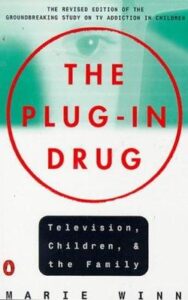
And he was very interested in what I was doing. It was a course in playwriting, and he himself had a play running on Broadway at the time called We Bombed in New Haven. And he was taken with the comedy, the three-act comedy that I was producing in his class. But I did not come out of the program at the University of Pennsylvania with a belief in myself as a novelist or as someone who was going to get into this wonderful universe of science fiction. I became an educator for a while, and I had used my filmmaking experience to become a media educator and was hired by several public school systems to, like, teach animation to junior-high-age kids or teach students how to make slide tapes. But at that time, in my circle of media educators, there was a lot of discussion about the effect that mass media was having on children. And most of that conversation was about the deleterious effects of television and movies on kids. There were books like The Plug-in Drug getting a lot of attention, very anti-television. And I said to myself, “Well, I can understand why people are worried that that TV is turning kids into lemmings, but what about the contrary argument, that television has a kind of cathartic effect, and that television maybe drains off impulses that one otherwise might be inclined to act out in the real world, anti-social impulses.” And I said, “You know, there’s kind of science-fiction novel in there. What if there was a society that was totally pacifistic, where there’d never been a robbery or a rape or a killing? And if initially this is a mystery, how in the world did they achieve this, this blessed state?” And then it turns out that they have a technology that lets them sort of hook themselves up to their television sets, except they control the content. If they’ve had some bad experience that day, an argument with the boss, or maybe even getting fired from their job, you could go home and shoot the boss on television, and nobody would get hurt and would drain off your desire you might have to commit that sort of crime in the real world. And then the plot became, what if on this utopian planet an astronaut arrives, falls in love with one of these, they’re human migrants, falls in love with them and decides that she needs just a little bit of an aggressive instinct to be fully human, that maybe, you know, you’ve got to have a dark side, you’ve got to have that dark side for real, not just in your fantasies. And so, he injects her with a little bit of the violence that these people drain off into a rive, a moat that encircles their city. And of course, this is a recipe for disaster. She has no immunity and becomes a maniac. And then he’s faced with this terrible dilemma: is he going to kill the woman he loves to save a civilization he hates?
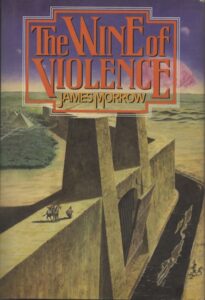
So, the whole thing arrived full-blown, all three acts. I found an agent, and we discussed whether this was, in fact, a science fiction novel or just a novel of ideas. And we ultimately decided it should be marketed as science fiction. She took it to . . . Holt Rinehart and Winston at the time had a line of SF they were publishing, Larry Niven and Robert Checkley, and they did Heinlein. This was Donald Hunter, the late lamented Donald Hunter at Holt. And I was off and running. I never looked back. The book didn’t become a bestseller, but it got quite a bit of review attention. The Science Fiction Book Club picked it up, it came out in paperback, and I said, “Okay, I’ve sort of kept the commitment I made with myself way back in tenth grade to see if I could write a novel of ideas.”
I want to go back to the university and studying creative writing/ I often ask authors who have done that formally if it turned out to be helpful. It sounds like, in your case, maybe it actually was. Not every author tells me that it was. So, what was your experience?
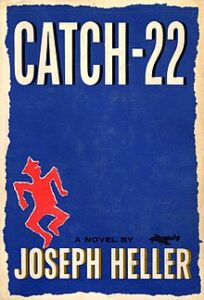
Certainly, having Joseph Heller and his sensibility was a big influence on me. He was very self-effacing. I would say that, you know, Catch-22, as far as he was concerned, its unbelievable success was kind of a fluke. Every year many worthy novels come out and disappear and die a dog’s death. Now, that said, it was just, you know, Catch-22 is, as you might imagine, a touchstone for me, James Morrow the satirist. That said, the other creative writing classes I had were happening at a time . . . this is, what, circa 1968, ’69, before it was thought that you could teach the crafting of prose fiction systematically. And so, the only thing that went on in these classrooms was workshopping, because reacting to each other’s manuscripts, as opposed to, you know, the sort of, I wouldn’t call formulas, but the sort of incredibly good advice you get, you would get from, let’s say, a John Gardner in his book—On Writing Fiction, as I recall, is the title. And, you know, there was no discussion of how to negotiate the marketplace, what it meant to get a literary agent, how important that could be, you know, nor was there a whole lot of explicit teaching about how do you create a character? How do you structure a plot? You know, what are the techniques you can use to engage a reader? What is the difference between suspense and surprise, et cetera, et cetera? And so, yeah, I can’t praise the other aspects of the University of Pennsylvania’s writing program at the time. I suspect it’s rather different now, maybe much more influenced by institutions like Iowa’s writers’ workshops.
The playwrighting interests me, as well. I’m an actor. I’ve done quite a bit of stage work and have written a couple of plays and directed them and all that sort of thing, and I always feel that that’s helpful in writing my fiction in a way and that I always have a very clear image of where everybody is in relationship to each other in my head, in the scene. And I think some of that comes from writing plays. And then I also think, of course, the dialogue side of things. Do you feel that that background in playwriting and scriptwriting has benefited your fiction?
Yes, very much so. I sometimes think of myself as a playwright manque, though, of course, it’s even harder to convince money people to put on a play of yours than to publish your novel.
Yeah, that’s for sure.
To say nothing of filmmaking. But yeah, I do see my work, as it may be, both playwriting and filmmaking by other means, and I’m told that my novels are visual and vivid, and I do think in terms of scenes. Not all prose fiction makers do, they’re maybe a little more free form. They don’t break into discrete acts or scenes or sequences or the three-act structure. But that’s where I am. These epics of mine are not only patterned on the structure of films, but I actually draw inspiration a great deal from the Hollywood product. At least, it’s always, whenever I’m working on it, it becomes an excuse to look at a bunch of movies and see how I’m going to get energy.
When you, I mean, you mentioned doing it in high school, but have you done acting yourself since then?
Very, very little. No, I’ve fallen away from that.
Well, you know, if the writing doesn’t work out, you can always try acting. There’s a good, solid career choice.
I think of the criticism from Peter Ustinov, who, as you probably know, was a man of many talents, a Renaissance man, and his whole family was into the arts. I mean, they were all musicians or writers or painters.
I think I read his autobiography, yeah.
Someone brought to the Bronx, brought to the family dinner, a guy she was dating. And they asked, “Well, what does he do for a living?” And he said he was a stockbroker. And they said, “You’re a stockbroker. Can you make a living from that? Why don’t you go into something safe, like poetry?” Because they were all successful. Not the norm.
No. My favorite actor joke, which I’ve heard a few times, is, “What’s the difference between an actor and a pizza?” And it’s, “A pizza can feed a family of four.”
I’ve heard that joke as being the difference between a science-fiction writer and a pizza.
Yeah, it’s the same joke.
So, let’s talk about your creative process. We’re going to talk about The Last Witchfinder, which I’ve read a chunk of. I haven’t gotten to the end, but I certainly intend to. This came out a few years ago, but I’ll let you give a synopsis of it and explain what it is.
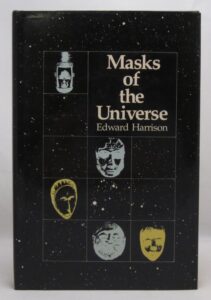
I had an amazing encounter, this would be 35 years ago, with a book by a physicist at the University of Massachusetts named Edward Harrison. The book is called Masks of the Universe. And the essential argument of the book is that we, the human species, will probably never know the Universe with a capital U. It will be, that kind of knowledge, absolute knowledge, will be denied to us. What we have are a succession, throughout human history, of universes, each with lowercase u, and this book, Masks of the Universe, is a kind of history of the evolution of human intellectual thought and scientific thought, vis a vis all these masks. So, Harrison takes us on a tour, from the magic universe of Paleolithic people to the mythic universe of the Sumerians, the Egyptians, and other early civilizations, the geometric universe of the Greeks, the divine universe of medieval Christian Europe, the mechanistic universe of Newton, the Age of Reason, and then our contemporaneous relativistic universe of modernity, of scientific modernity. Harrison is particularly, was particularly, obsessed with what he calls the witch universe, that time when everybody understood that demons were what made things happen, that the world was not so much enchanted as haunted.
It was called the Renaissance ex post facto. But I encountered this amazing sentence, and I just Xeroxed it, and I want to read it. This is from page 214 in Masks of the Universe. Harrison says, quote, “The supposed Renaissance was a disordered interlude between sane universes,” that is between the medieval and the Age of Reason, quote, “a bedlam of distraught world pictures terrorized by a witch universe, created by leaders with fear-crazed minds, an age in thrall to a mad universe on the rampage, which would have destroyed European society but for the intervention of science.” So, I read that sentence, and I said, “Oh, my God, there’s an idea for a novel, an entire society nearly destroyed by its own theology. I mean, I have to work with that someday. I have to be able to turn that into an epic, even if Harrison is overstating the case,” and I think perhaps it was. “But for the intervention of science, Europe would have destroyed itself. I’ve got to work with that theme!” But I couldn’t come up with an entree, year in, year out. How in the world could one traumatize an event so large and momentous?
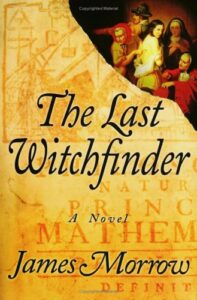
And after a gestation of 15 years, I had a breakthrough, and I said, “You know, a character,” in this case, I intuitively knew she must be a woman, “a woman born in about 1678, would have lived through this amazing transition, this rotation from the witch universe to what we call retrospectively the Age of Reason or the Enlightenment.” And so, The Last Witchfinder was born and became the story of Jennet Stearne, who makes it her lifetime mission to try to bring down the parliamentary witchcraft statute of 1604. She has many adventures in the course of trying to fulfill this mission. It’s really, it’s both a mission and a pledge to her Aunt Isobel, a kind of deathbed promise. Isobel is herself mistaken for a witch and executed by the powers that be in the England of early modern Europe. Eventually, eventually, Jennet engages in a very creative act. She masquerades as a witch and in a sense then puts herself on trial for consorting with demons, and because she’s become good friends with the young Benjamin Franklin, she actually becomes a lover of Benjamin Franklin, this is circa 1731, she knows she will get publicity in Franklin’s periodical, the Pennsylvania Gazette. So, this sort of media circus trial occurs in Philadelphia, and Parliament takes note of it in England. And so, this is the kind of science fiction, I guess, that would be called secret history or hidden history. This is the real story that you’ve not known until now of why that statute was finally taken off the books.
So, once you had this idea, what did your planning process and research process . . . because clearly, you put a lot of research into this. I noticed in your foreword you were talking about a great deal of this is reality, with a few tweaks of what we . . . well, what we think is the real history . . . here and there to tell the story. So, what did your research and planning process look like? And is this typical of your work?
I always do a lot of research, and it’s mysterious to me. And I don’t want to become too conscious about it, self-conscious about it. How does one know when to stop the research and write the damn novel? I mean, my facetious answer to your question would be, first I write the novel, and then I do the research, you know, sort of retrofitting. But it’s more of a dance. It’s very complicated. As I did the research, a lot of actual history kind of played into my hand. I felt very fortunate that, for example, when Jennet is abducted by Indians around 1695, she’s now living, she starts out living in England, but then she goes to the colonies because that’s where her family has moved. She ends up in Haverhill, Massachusetts, and it turns out that, in fact, Haverhill, Massachusetts, was attacked by the Abenaki in 1695.
A big breakthrough for me was, I always knew that I wanted to use not only Benjamin Franklin but also Isaac Newton as sort of personification of the two universes, the universes that are in play at this point in history. Franklin, sort of the avatar of the Enlightenment, cheeky and contrarian, as opposed to Newton, one of the most pious men who ever lived. Very much of a piece with the Renaissance. And it turns out that they actually almost met in 1725. Franklin is in London. He has a commission from the royal governor of Pennsylvania to buy printing equipment. And he has a letter of introduction to Newton from someone in Newton circle, I think it was the physician Pemberton, who edited the second edition of Principia Mathematica. Newton does not want to meet this cheeky kid from Philadelphia, so the meeting never occurred. But in my novel, it occurs. I have Franklin and Newton in the same carriage together, but they just talk past each other. Franklin wants to discuss electricity; Newton is preoccupied with counterfeiters at that time and with biblical prophecy. And so, it’s not simply that they are from two different generations, this is the old Newton and the young Franklin, not just two different generations, two different continents, they’re really from two different universes: Franklin of the Enlightenment and Newton of the Renaissance. So I said, well, this is playing into my hands. This is a lot of fun. It’s going to work.
And then other facts, like the Baron de Montesquieu, who ends up defending Jennet at the trial she arranges for herself, really could have ended up in Philadelphia in 1731. He was a young aristocrat taking the grand tour that European aristocrats always took at that time. There was even, according to Franklin, on a witch trial in Mount Holly, New Jersey, at this time, and I simply moved it across the Delaware to Philadelphia. Franklin’s account of the witch trial makes it clear that it never really happened, it’s simply a hoax that he put into the Pennsylvania Gazette. But I decided to take Franklin at his word. So, I guess for me, Ed, the process was like walking through a field with all of these sort of pottery shards lying around, you know, and I would pick them up and examine them and try to fit them to each other and end up with an urn of my own design.
From what I know of Franklin, I suspect he’d like this story.
He comes off very, very well. Yeah.
Did your outlining . . . do you do, like, a detailed outline or just hit some high points and then go for it? What’s that process like?
I do. It’s a kind of freeform outline. You know, I wasn’t really sure how the book was going to end, though. And that’s true of almost all of my novels. I have to kind of feel my way to the climax. But I would never plunge into a project this ambitious, or any sort of a novel, without a rough sense of what the three acts were going to be. You can hear my playwriting heritage coming out here. But that said, I always appreciate a remark that the film director John Huston once made. He said, there comes a time when every film project when you throw away the script and make the movie, by which he means, you know, don’t let the script become your master. You must allow for improvisation, things the actors are going to bring to it, camera setups you never imagined until you were actually on the set, and so forth. And I think for me, at least with prose fiction, there comes a time when you throw away the outline and write the damn novel.
Talking about the three-act structure, you know, it just now occurred to me, but almost every play I see these days is actually two acts. People always talk about the three-act structure, but they’re generally presented as two acts.
It certainly was the classic structure of musicals, right? It was almost like an unwritten but inviolable law that every musical must have two acts with an intermission.
What’s your actual writing process like? Are you a fast writer, a slow writer? Do you write with parchment, quill pen, and parchment out under a tree where an apple could fall on your head, or . . .?
I guess I wrote my first novel, The Wine of Violence, in longhand, you know, Bic pens on legal pads, and I’ve never been able to compose on a typewriter. I envy writers who could do that. So, I’d always have to . . . sometimes I would type it up myself, and then then I would often have to hire a professional typist to try to cope with all the notes I would put on my first typed draft. Now, of course, I use word processing. I’m working very hard on not being so distracted by the Internet that I stop because I just have to look up a fact, sometimes even because I know I spelled the word wrong, I have to stop to correct the spelling. These are terrible habits. And if any embryonic writers are listening, try to never acquire these bad habits that James Morrow has. I’m slow, methodical. It seems to take forever. In theory, every novel I write should be a year. I remember a remark that Stephen King makes in his quasi-autobiography, his book called Danse Macabre, “Any writer who can’t produce a novel in a year is merely dicking off,” and I agree with Stephen King, but somehow, it always takes two, three, four years. It’s been a lot of time on rewriting, workshopping, showing it to friends and colleagues. And also, I have to say, because I love the medium so much and regard it as such a privilege to work within the medium of the novel, I don’t want to surrender a given book. I want to live inside it.
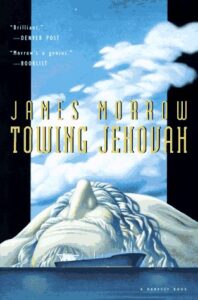
And perhaps because my premises are so often ridiculous, preposterous, like Towing Jehovah, schlepping the corpse of God to its final resting place in the Arctic on a commission from an angel. Oh, come on. That’s so bold and bold and absurd that I didn’t believe it at first. But I’m living inside and retrofitting a whole lot of facts about life aboard a supertanker onto the story and talking to people who had actually lived on supertankers and then visiting, you know, visiting a lot of death-of-God theology, month in, month out, I started to believe that Towing Jehovah could be the case, but it took a while.
Well, your prose is very rich, and especially in The Last Witchfinder, you’re going for a bit of that archaic diction, I guess. Is that . . . what does your revision process look like? Does that kind of language flow out of you naturally, or do you go back and tweak it a lot to get to that level of . . . erudition, I guess.?
Yeah, Witchfinder was a difficult struggle in particular, because I was trying to . . . I was trying to hit the archaic qualities that we encounter in Restoration drama. And I read a lot of Restoration plays to try to get that voice right, and I read contemporaneous documents. And I have to say it’s the aspect of The Last Witchfinder that I’m least satisfied with. I’m not sure I got it right, but I was determined to try to not settle for modern English, where it becomes the reader’s job to imagine they’re speaking in idioms of the day. I was very influenced by John Barth’s The Sot-Weed Factor, which is set in exactly the same time zone as The Last Witchfinder, Restoration England and Colonial America. I stole a lot of locutions from him that he had gotten from somewhere else.
But The Last Witchfinder was almost seven years in creation, and much of it was just, yes, endlessly revising the dialect to try to get it to sound right. You know, the language is in transition. They’re sort of shedding Elizabethanisms, sort of the language of Shakespeare, but a lot of that still stayed around. And so, with the novel I did subsequently . . . well, there was a modern novel in between, which was set in Victorian England. That was rather easier to do because we have a pretty good idea from Dickens how the Victorians spoke. But it’s less clear in the case of Witchfinder.
And I guess you still have to also make sure that your language is comprehensible to a modern reader.
That was the challenge, you know, and some of the positive reviews of Witchfinder complimented me on how you adjust to it fairly quickly. It seems very strange, all of this archaic diction. But you kind of figure it out, and you flow with it. I think the book is easier to negotiate than Shakespeare. For example, when you read Shakespeare, it’s a self-conscious experience. You’re constantly making little almost subconscious translations in your mind.
One reason he works better on stage, where you can kind of understand what’s going on from the action, even if you don’t know exactly. Of course, we should make the point that, at least according to the beginning of the book, you didn’t actually write it. It was written by Isaac Newton’s book, which I thought was hilarious, with all these old books that were, you know, they were actually writing these new books, and the authors weren’t really involved.
I guess that’s the other dimension of Witchfinder that owes something to my genre background. There’s a sense in which The Last Witchfinder is taking place in a universe that isn’t quite ours, a universe in which books are alive. They’re sentient creatures who have thoughts and agendas and who can nevertheless fall in love with humans, just as we fall in love with books, right? And they write other books. And what I was up to there and was, I knew the book was going to be, at one level, a celebration of the Enlightenment. I would argue that Harrison is really on to something, the Age of Reason, the scientific understanding of nature came along just when it was needed because the witch universe was a nightmare, a bedlam, as he puts it. At the same time, I said, you know, I don’t want to become an unqualified cheerleader for the Enlightenment because there is a case to be made against reason and the deification of reason, of the sort of church of reason that emerges during the French Revolution. That’s a dead end, too. And the critics of the Enlightenment always point to the French Revolution, that’s always exhibit A in any indictment of that period, which for me was, I guess I am a child of it, I’m a child of Voltaire and Candide, but this conceit of the Principia Mathematica and its somewhat sardonic understanding of the worl, enabled me to make the case against the Enlightenment through the voice of the Principia, which is privilege, which has perspective on all this. I wanted to avoid what I think is a pitfall of a lot of historical fiction, of the characters being acutely aware of how their descendants interpret their actions, which I think it is simply not given to us to know. I had an initial way of getting this perspective on history by having Jeanette’s Aunt Isobel, the woman whose death sends her on her great commission, having Isabelle writing an epic poem that she’s channeled from the ether that recounts, that narrates what’s going to happen in the next generations and the rise of experimental science. And then I said to myself, “Oh, no, that’s a kind of mystical idea, that’s one that’s at odds with the rationalism that I’m defending in this book.” So, I did something that was even more irrational than the epic poem. I did this crazy, this crazy, contemplative narrator. And I’m glad that you’re fond of it.
I guess it is Prin(k)ipia, isn’t it? I tend to give it more of a, like an Italian pronunciation, Prin(ch)ipia.
I think both are acceptable.
What’s the editing process like for you? What do editors come back to you suggesting you do at the editing level?
Well, when it comes to professional editors whose job it is, whose job description is to be an editor, that’s what it says on their door, Editor . . . the days of Maxwell Perkins, I think, are over; the days when somebody could take a manuscript that was kind of raw and rough and say, “Well, here’s how we can, here’s how I can work with this. And I’ll enter into a conversation with the author, and we’ll reimagine this book so that it’s really going to work for the reader.” That’s not what editors are paid to do anymore. They’re expected to acquire ready-to-run books on the whole. And so, I have rarely gotten suggestions that went very deep into the book. They tended . . . you know, the editor will send you a two-page letter with suggestions. And I respect the industry because the author has final cut. Rarely will an editor ever say, “If you don’t go along with this, we’re not going to publish your book”. So, I guess what I’ve said could be boiled down to the notion that you have to be your own editor. And that’s another thing that protracts the composition process for me because I don’t want to . . . sending a book out prematurely, that, I feel, is one of the worst mistakes you can make. You can’t count on an editor seeing its potential. The potential better be there upfront.
We’re getting close to the end of the hour, just a few minutes left, so I want to get to the big philosophical questions, and clearly, you have fun with those. And there’s three of them, I guess. Why do you write? Why do you think any of us write? And why literature of the fantastic in particular?
Well, why do I write? I write to change the world, to make it a better place now.
We’ve been talking about The Last Witchfinder, and I write because I feel so privileged to be part of what I would call the great post-Enlightenment conversation. The situation we find ourselves in, in modernity, where everything can be put on the table and where you can’t say, “Well, because I’ve had a revelation, we don’t need to continue this discussion any further,” that argument doesn’t work anymore. So, I just feel that I’m making my little, my small contribution to the, you know, to the fight against nihilism, really a fight against a kind of theocracy that pretends that mere human beings have ultimate answers. And they don’t. They don’t.
Why does anybody write? I can’t speak to my colleagues. Some of them would say they do it because it’s so much fun and I make money from it.
On the human scale, then, why do humans tell stories?
We are storytelling animals, Homo narratives, I think. But with science fiction in particular, I think you have an opportunity to enrich the vocabulary with which we address the big mysteries of existence, these questions of meaning, and how then shall we live? I mean, if you’re lucky, your book even ends up in the dictionary, a la Frankenstein and 1984. Frankenstein, you know, enlarged our vocabulary, it gave us . . the very name means, or has become synonymous with, the idea that with the power of science must come responsibility. And the tragedy of Victor Frankenstein is not that he was curious, I would argue, or not that he did this borderline blasphemous experiment, but that once he brought the creature into the world, he abandoned it. 1984, of course, the first and last time an author actually owned a year, expanded our vocabulary with terms like Newspeak and Doublethink and Big Brother. We have a way to talk about things that previously we couldn’t talk about. I think of Wells and The Island of Dr. Moreau, you know, a kind of metaphor for this brave new world of genetic engineering and the power we’re developing to manipulate the human genome. Certainly, Margaret Atwood in The Handmaid’s Tale just gave us the concept of the handmaid, this woman who’s under the thumb of a patriarchy. And these are all science fiction titles.
Even in the case of fantasy, it’s important to remember that it also stands against nihilism. The fantasy does not in any way argue the world is up for grabs, the way the nihilist would do and say, well, therefore, my authority is the last word, because we all know reality is up for grabs, there is nothing that’s grounded anymore, which would be sort of nihilism in a nutshell. Tolkien made the point that in a fantasy saga, the trees are real trees, and the grass is real grass, and the rocks are actual rocks. It’s not a fantasy world in the sense of everything being surreal or absurdist. There is an external reality up there, out there, and the very title, Lord of the Rings, I’ve always been fascinated that it points to the villain of the story, to Sauron. Why is that? And I think it’s because the main, the big idea that Tolkien is playing with is the nature of evil, not in some dopey Manichaean sense, but just the, you know, those who think that there is no external reality and therefore they can set the terms, they can set the terms of reality themselves. The line that Gandalf has, “Let folly be our cloak,” it would never occur to Sauron that the Fellowship is going to give up this power. Evil has far less imagination than people of goodwill possess, and I think that’s a very affirming idea, and I think that’s why the book, that novel, has the title it does.
And we’ll. . . what are you working on now? But first, we should mention that you do have something out, a brand-new novella in And the Last Trump Shall Sound with Cat Rambo, whom I’ve had on the show, and Harry Turtledove. So, maybe just briefly, what is that? I have a pretty good idea, but I’ll let you describe it.
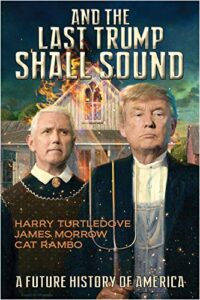
And the Last Trump Shall Sound is a set of novellas that speculate on a near-future USA in which Donald Trump won a second term, and this was followed by the election of Pence, who also got a second term, whereupon the states of Oregon, Washington, and California come together under one flag, call themselves the nation of Pacifica, and secede from the Union. That was the premise as it was pitched to me by Shahid Mahmud, the publisher who came up with this idea because he was so distressed to see the way that the nation was being torn apart on the macro scale by the Trump phenomenon and families were being torn apart on the micro-scale. And he just thought, well, maybe science fiction writers can make a valuable contribution to that conversation. I turned him down initially. I said, “Shahid, I can’t work with this. The thought of Trump being re-elected and Pence getting two terms after that is so depressing. Sorry, I’m out of here.” And so, after I rejected membership in this committee, I remembered something that Shahid had said in pitching it to me, which was that Trump would be dead when the story opened. And I said, “Well, what if Pence is falling under the spell of a spiritual adviser who is not all she seems, and was, in fact, working for Pacifica. What if Pence becomes convinced that he could bring Trump back from the dead? That could be a lot of fun. All right.” So, the very next day, I said, “Shahid, is the slot still open? Can I still join your project?” And he said yes, and I’m really glad.
So, it is still science fiction/fantasy. It’s not just political commentary.
These three novellas, they’re all in the grand tradition of sort-of near future . . . not prophecy. I think the distinction that Orwell makes between a warning and a prophecy is very important. So, I don’t think we’re saying this is going to have to be how it turns out, but we are trying to just diagnose what’s happening, and we all come at it from three very different directions. I should hasten to add that when Trump is actually resurrected in the Washington National Cathedral, what’s going on is not supernatural. It appears that Trump has come back from the dead, but in fact, it’s an audio-animatronics robot.
Like Disneyland.
Exactly.
And what else are you working on?
Well, let’s see. For once, I think I actually have written a novel in a year, as Stephen King prescribes. It’s called Those Who Favor Fire, and it’s a comedy about climate change and a title I’ve always wanted to use. Many years ago, I wrote a nuclear war comedy, or dark comedy, that saw print as This Is the Way the World Ends. I wanted to call it Those Who Favor Fire, but at the time, another work of fiction with that title was coming out, and my editor and I said, well, we want to avoid confusion. So, I finally got to use the line from the Robert Frost poem “Fire and Ice” as the title of my climate-change novel. And very briefly, it posits that the hollow earth theory is the case, and there’s actually a race of human beings living beneath the surface of our consensus reality. And they’ve got a problem with ice. Their side of the planet has fallen victim to global cooling. So, it’s an allegory, I guess, though I like to think I can avoid the usual pitfalls of allegory where things just map neatly onto each other.
Any indication of when that will be out?
Well, yeah, sure. It’ll be done in a year, and so it will be out next year, except, no, this is James Morrow, and I’m sure I will once again trip myself up with a long rewriting and workshopping process. And it’s not a book that’s been commissioned by a publisher. And, you know, I think I’ll take it to St. Martin’s Press, who did my last novel, to see hardcover print. But there’s no guarantees. It may or may not ever find a publisher. As you may know, I don’t want to spoil your day, Ed, it could even happen to you, a writer at my age can end up in a condition that’s called post-novel, where, you know, where people will take a much harder look at your sales figures and your status, and if you’ve not had a bestseller, it becomes really hard to unload a novel.
Yeah, well, here’s hoping. And those who would like to see how you’re doing, where can they find you online?
I have a website, www.jamesmorrow.net, and I have a Facebook presence of sorts, and I do some twittering, some tweeting.
Okay, I will put those links in, as I always do. And I think that’s about our time, so, thanks so much for being on The Worldshapers. I enjoyed that. I hope you did, too.
I enjoyed it very much. You’re welcome.

